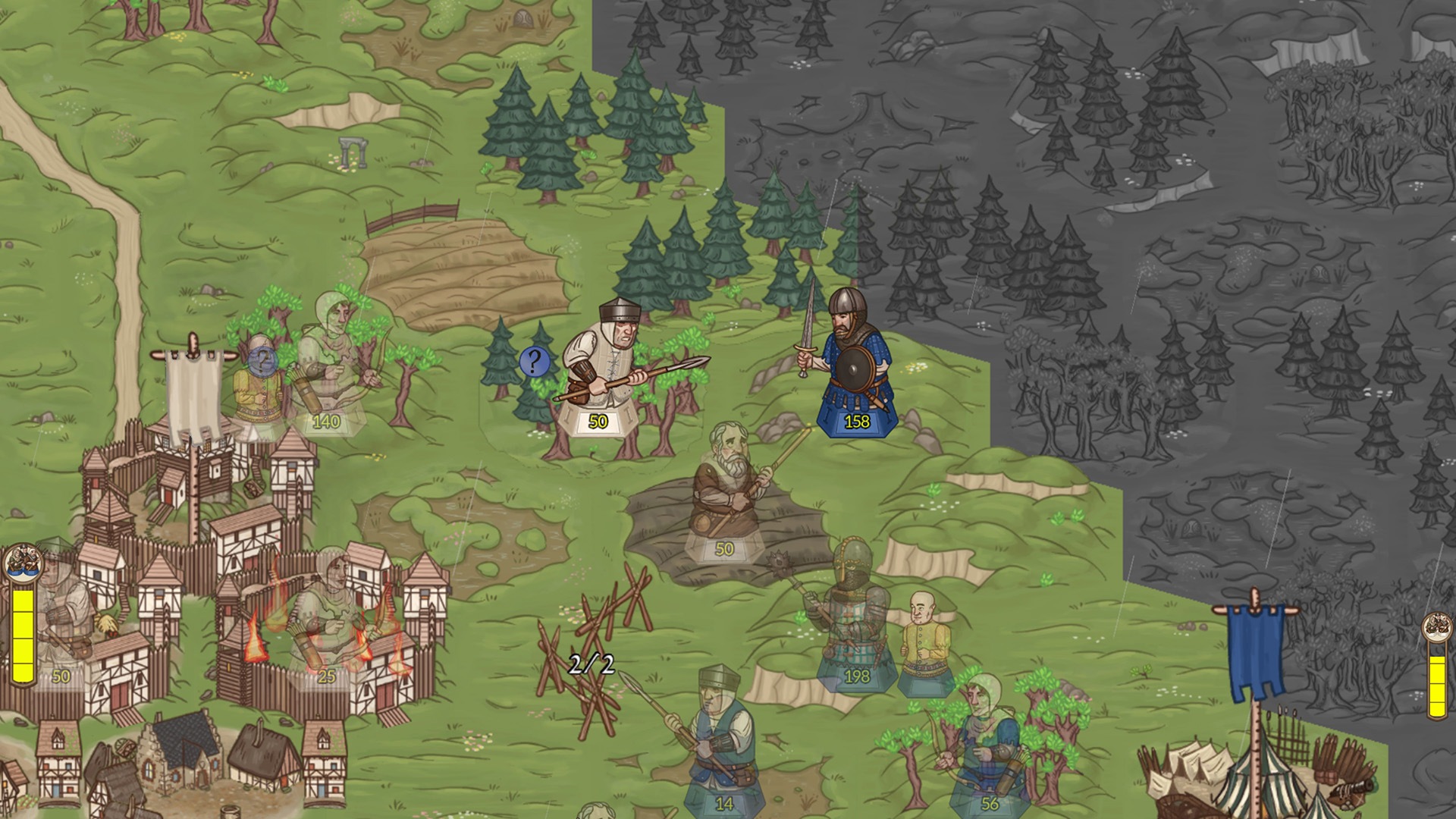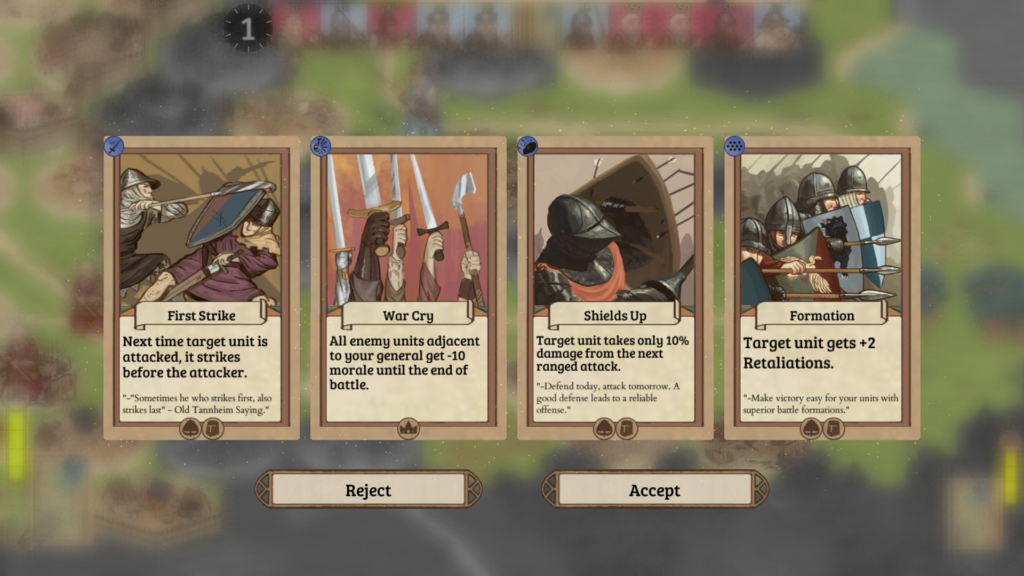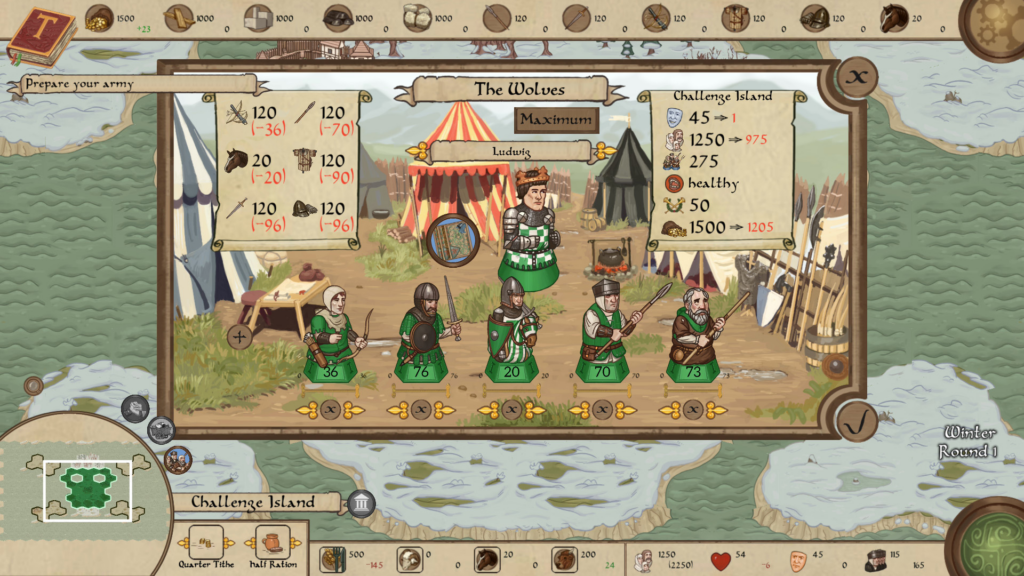Rising Lords, the debut offering from Argonwood, marks a notable entry into the turn-based strategy genre. This game, featuring a medieval setting enriched with card and board game mechanics, stands out in its creative integration into the video game medium. Recently, we had the opportunity to delve deeper into the game’s nuances through a Q&A with Chris Fernholz, the Managing Director. This insight adds another layer to our understanding of the game, which we explore in this comprehensive review.
Rising Lords: General gameplay
In Rising Lords, players will control a settlement where they must manage resources such as crops, food, and trade goods to upgrade their buildings and ultimately armies. This allows you to move onto and conquer new areas, increasing your strength and wealth.

There are different game types available, though they all follow a similar structure. Players can choose to play “scenarios” which are shorter games that have specific win conditions such as gaining a certain amount of gold or conquering all opposing regions. There is also a multiplayer mode where players can battle against each other in scenarios or battles. Scenarios will be composed of settlement and economic management whereas battles are what you’d expect, armies clashing against each other.
Additionally, Rising Lords has a story campaign that follows Tankred, the son of Edmond of Tanneheim, as he attempts to step into his late father’s shoes and lead his people. There is a delightful choose-your-own-adventure quality to the campaign where after reading bits of the story with accompanying visuals, players can choose how they want to proceed. It’s a fresh and rewarding feature of the game.
Now that we’ve gone over the structure of the game it’s time to get down to the nitty gritty. I said this title was ambitious earlier and that’s because of what it tries to accomplish. It consists of economy and resource management, where players must assign workers to tend to farms, sheep, smitheries, inns, bathhouses, and much more. These are all available to upgrade and will generate different sorts of materials for the player to continue growing their settlement.
This is in itself a whole game and one they make relatively easy. There are a lot of icons and numbers on the screen but the tutorial does a nice job of explaining things.
Entering the battlefield
As well as managing your settlement players will also need to build decks of combat cards and build armies to conquer opposing regions and defend themselves from invaders and enemies. Armies can simply be bought with resources which is another reason economic management is so important.

Combat decks however are built with experience points. Players can spend these points to unlock skills which will manifest as cards in their decks. Decks can be built and reset during the game so players can mix things up and alter decks to fit their playstyles.
During combat, players will move groups of units, such as archers or knights, like pieces on a game board. Archers have greater attack range than spearmen of course and there is an advantage to attacking from on a hill as opposed to level ground. When it’s the current player’s turn they can play cards from their hand. Cards affect unit mobility and strength. For example, there is a card that creates a bridge that will allow units to cross shallow water. There is another card that lets units ram through walls and another that decreases the morale of surrounding enemies.
Morale is a resource that must be managed during battle, if it’s low then units may not follow commands, similar to how Pokemon may not listen to their trainers if they don’t have the respective badge. A battle can be won without defeating the entire enemy army if their morale is destroyed.

Overall thoughts on Rising Lords?
Rising Lords stands as a testament to Argonwood’s ambitious foray into the strategy genre. While it expertly weaves together elements of card and board games into a medieval tapestry, the game sometimes falters in seamlessly integrating its complex battle system with settlement management.
Despite these challenges, it offers an engaging and rewarding experience, providing a fresh twist on traditional strategy games. Rising Lords is a commendable effort, worthy of attention from strategy enthusiasts, even as it leaves room for refinement.
Rising Lords is available to play now on Steam. If you’ve decided to give it a chance, why not read more of our reviews while you wait for it to download, just click here to go and check them out.